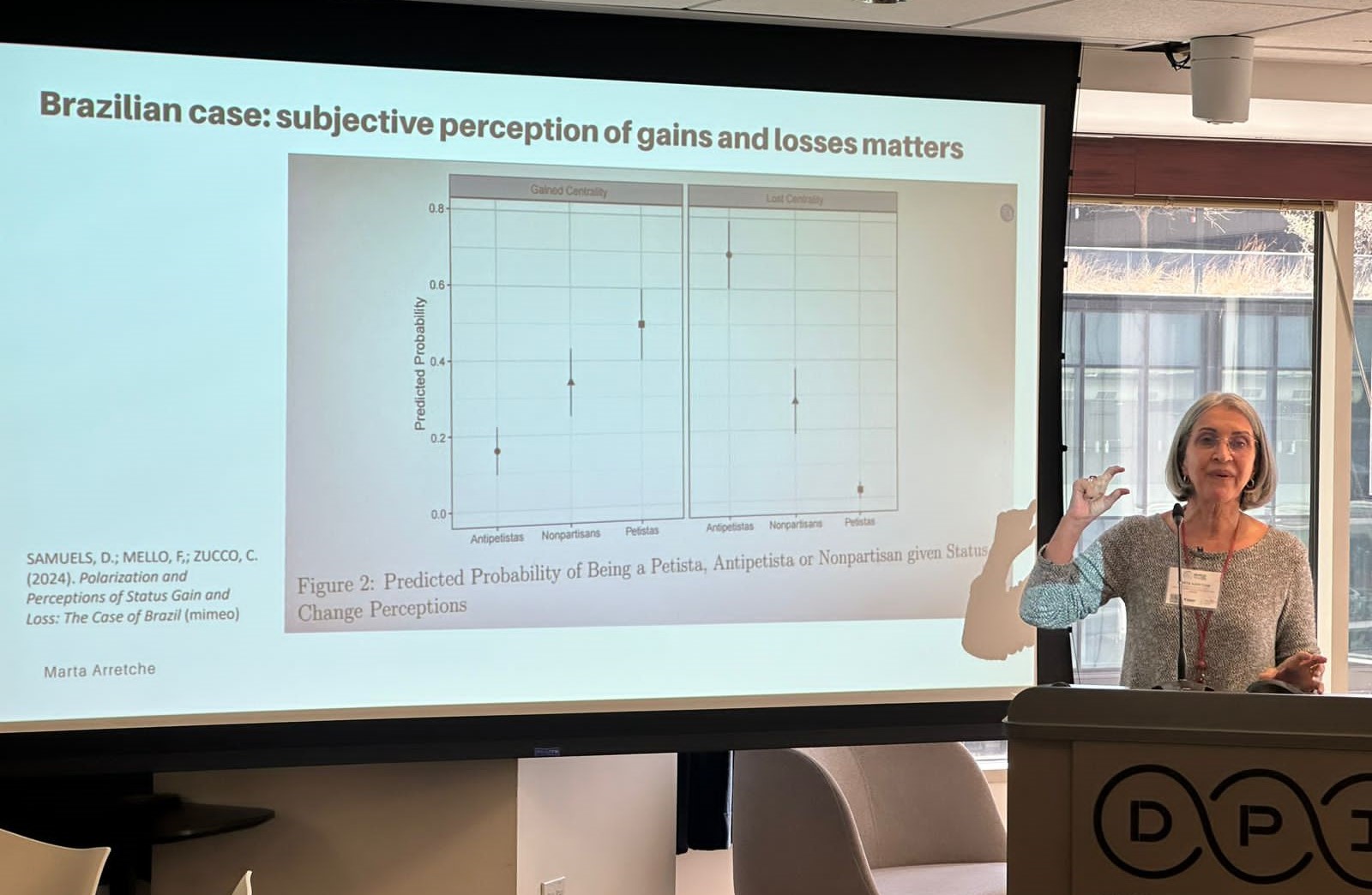

Although the Gini index has decreased since the early 2000s, political polarization in Latin American countries has increased over the same period (photo: Joédson Alves/Agência Brasil)
Countries in the region are experiencing a different phenomenon from that observed in the United States and Europe, where increased social inequality may have been the cause of the advance of political polarization. The assessment was made by participants in FAPESP Week Illinois.
Countries in the region are experiencing a different phenomenon from that observed in the United States and Europe, where increased social inequality may have been the cause of the advance of political polarization. The assessment was made by participants in FAPESP Week Illinois.

Although the Gini index has decreased since the early 2000s, political polarization in Latin American countries has increased over the same period (photo: Joédson Alves/Agência Brasil)
By Elton Alisson, Chicago | Agência FAPESP – The theories offered by the dominant literature in political science today to try to explain the sources of the political polarization that has endangered democracy around the world are adequate for the United States and Europe, but do not make sense for the countries of Latin America. For this reason, greater collaboration among political scientists is needed to identify other, more plausible hypotheses for the phenomenon that the region is also experiencing.
The assessment was made by researchers participating in a panel discussion on democracy and social inclusion held on April 9 in Chicago (United States) during FAPESP Week Illinois.
“There’s an avenue for possible research collaboration between Latin American and North American political scientists, for example, to advance in identifying the sources of political polarization in the two regions and to overcome this challenge in the literature. We have a lot of data and interest in working together to better understand this phenomenon,” said Marta Arretche, professor at the University of São Paulo (USP) in Brazil and researcher at the Center for Metropolitan Studies (CEM) – a FAPESP Research, Innovation and Dissemination Center (RIDC).
According to the researcher, the most influential literature in the social sciences today, mainly in the United States and Europe, establishes a positive link between social inequality and political polarization to explain the rise in electoral strength of extreme right-wing parties and the threats to democratic institutions.

Marta Arretche during her lecture at FAPESP Week Illinois (photo: Elton Alisson/Agência FAPESP)
According to this theory, wealthier democracies have experienced an increase in social inequality, which would be the cause of voter support for the proposals of far-right parties.
“According to this theory, the left-wing parties have somehow abandoned their traditional electorate and implemented pro-rich policies, and so the right-wing parties have exploited the discontent of the poorest, who have lost out in the current democratic regimes. But recent research in Latin America, and Brazil in particular, provides good evidence that this may not be true for countries in the region,” Arretche said.
Ongoing postdoctoral research at the CEM on the determinants of political polarization in Latin America shows that although the Gini index (a measure of social inequality) has decreased since the early 2000s, political polarization in Latin American countries has increased over the same period.
“There’s evidence for Latin America that doesn’t confirm the positive association between increases in inequality and increases in polarization. On the contrary, it shows a negative association,” Arretche said.
Another study, also conducted by Brazilian political scientists, on how the perception of gaining or losing social status influences the political positions of the Brazilian electorate, showed that those who vote for left-wing parties in the country are those who believe they have gained centrality in the political arena in the last 20 years. On the other hand, those who voted for right-wing parties perceive themselves as having lost centrality in recent years.
“The conclusion of the authors of this study also goes in the opposite direction of the dominant literature on the United States and Europe. They conclude that the progressive policies implemented by left-wing parties in Brazil since the early 2000s have shaped the political divide that exists today,” Arretche explains.
On the other hand, another ongoing study conducted by the researcher and her collaborators also provides some evidence of disenchantment among Workers’ Party (PT) voters in recent years.
“The party has lost support among its own voters during the crises that Brazil has gone through in the last five years,” Arretche said.
Political crisis
The changes that have taken place in Brazil since 2013, marked by a very intense political crisis, have changed the behavior of actors and generated instability in the pillars of coalition presidentialism in the country, pointed out Andrea Freitas, coordinator of the Center for Public Opinion Studies at the State University of Campinas (CESOP-UNICAMP).
This parliamentary regime that exists in Brazil and other countries, in which the president tries to form coalitions because he doesn’t have a majority in the legislature, could change its configuration in the country, the researcher said.
“My hypothesis is that given the long period of political crisis that Brazil has gone through in the last ten years, there’s been a real change in the behavior of political actors in the country, and we’re no longer going back to the same institutional bases of coalition presidentialism. We’re going to have to build a different relationship,” Freitas said.
Health inequalities
Brazil and other countries have also undergone transformations in other areas, such as health, that may contribute to increasing levels of inequality in the country, explained Rudi Rocha, a professor at the Getúlio Vargas Foundation (FGV) in São Paulo.
One of these changes is the aging of the population, which means that health systems not only in Brazil but in many other countries will have to deal with an increasing number of chronic diseases and other conditions that are more expensive to treat, Rocha noted.
“In the past, health systems in countries like Brazil only had to deal with childhood infectious diseases, which are cheap to treat through vaccination, for example. Now, in low- and middle-income countries, inequalities will eventually increase if they don’t have the capacity to meet the challenges of an aging population,” he said.
The public sector’s difficulty in raising sufficient funds to meet healthcare needs opens up opportunities for the private sector to enter and expand its presence, the researcher pointed out.
“This is already happening in many places around the world, and it could also be a vector of inequality. Ultimately, only those who can afford it will have access to private health care,” Rocha said.
Another vector of social inequality in the country is climate change, which has a more direct impact on poor people, who don’t have access to health care, the researcher stressed.
For more information about FAPESP Week Illinois, visit: https://fapesp.br/week/2024/illinois.
Republish
The Agency FAPESP licenses news via Creative Commons (CC-BY-NC-ND) so that they can be republished free of charge and in a simple way by other digital or printed vehicles. Agência FAPESP must be credited as the source of the content being republished and the name of the reporter (if any) must be attributed. Using the HMTL button below allows compliance with these rules, detailed in Digital Republishing Policy FAPESP.





